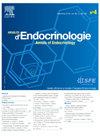母体肠道微生物组改变对子代代谢程序和神经内分泌可塑性的长期影响
IF 2.9
3区 医学
Q3 ENDOCRINOLOGY & METABOLISM
引用次数: 0
摘要
代谢性疾病的患病率高得惊人,尤其是在儿童中,这强调了揭示这些病理状况发展的机制的必要性。先前的研究表明,母体营养环境的改变会破坏下丘脑的发育,导致后代持久的代谢后果。最近的证据还表明,母体肠道微生物组(mGM)与后代的大脑发育有关。然而,目前尚不清楚mGM是否会影响后代下丘脑的发育,并对代谢调节产生短期和长期的影响。在这里,我们研究了受损的mGM如何影响后代的生理和神经发育结果。我们建立了一个在妊娠和哺乳期母体生态失调的小鼠模型,通过给大坝施用广谱抗生素(ABX),针对关键的发育阶段。抗生素治疗显著降低了母猪从妊娠到断奶期间的肠道细菌负荷。母鼠体重、产仔数和产仔性别比未受影响。然后,我们评估了母体生态失调对后代代谢调节的影响。经抗生素处理的幼崽(off_ABX)断奶前体重增加较慢,断奶后体重增长较快,主要是由于纵向生长增加。成年后,雄性off_ABX表现出改善的代谢调节,而雌性表现出青春期延迟但没有代谢变化。初步结果表明,off_ABX在正中隆起血-下丘脑屏障中引起神经解剖学改变,在脑外周界面代谢调节中起关键作用。总之,这些结果表明,mGM影响下丘脑神经内分泌的发育,对后代的代谢调节和生殖功能产生短期和长期的影响,并与血液-下丘脑屏障的结构改变有关。本文章由计算机程序翻译,如有差异,请以英文原文为准。
Long-term impacts of maternal gut microbiome alterations on offspring metabolic programming and neuroendocrine plasticity
The alarmingly high prevalence of metabolic disorders, particuarly in children, underscores the need to uncover the mechanisms involved in the development of these pathological conditions. Previous studies showed that alterations in the maternal nutritional environment can disrupt hypothalamic development, leading to enduring metabolic consequences in offspring. Recent evidence also linked the maternal gut microbiome (mGM) to offspring brain development.
However, it remains unknown whether the mGM affects the development of offspring hypothalamus, with short- and long-term consequences on metabolic regulation.
Here, we examined how impaired mGM impacts physiological and neurodevelopmental outcomes in offspring. We developed a mouse model of maternal dysbiosis during gestation and lactation by administering broad-spectrum antibiotics (ABX) to dams, targeting critical developmental phases.
Antibiotic treatment markedly reduced dams’ intestinal bacterial load from gestation to weaning. Maternal body weight, litter size and litter sex-ratio were unaffected. Then, we assessed the consequence of maternal dysbiosis on offspring metabolic regulation. Offspring of antibiotic-treated dams (off_ABX) displayed slower pre-weaning body weight gain and a catch-up growth after weaning, primarily due to increased longitudinal growth. At adulthood, male off_ABX displayed improved metabolic regulation, while female exhibited delayed puberty but no metabolic changes. Preliminary results suggest that off_ABX present neuroanatomical changes in the blood-hypothalamic barrier in the median eminence, which plays a crucial role in the regulation of metabolism at the brain-periphery interface.
Together, these results suggest that mGM influences the development of the neuroendocrine hypothalamus, with both short-and long-term consequences on metabolic regulation and reproductive function in offspring, associated with structural changes of the blood-hypothalamic barrier.
求助全文
通过发布文献求助,成功后即可免费获取论文全文。
去求助
来源期刊

Annales d'endocrinologie
医学-内分泌学与代谢
CiteScore
4.40
自引率
6.50%
发文量
311
审稿时长
50 days
期刊介绍:
The Annales d''Endocrinologie, mouthpiece of the French Society of Endocrinology (SFE), publishes reviews, articles and case reports coming from clinical, therapeutic and fundamental research in endocrinology and metabolic diseases. Every year, it carries a position paper by a work-group of French-language endocrinologists, on an endocrine pathology chosen by the Society''s Scientific Committee. The journal is also the organ of the Society''s annual Congress, publishing a summary of the symposia, presentations and posters. "Les Must de l''Endocrinologie" is a special booklet brought out for the Congress, with summary articles that are always very well received. And finally, we publish the high-level instructional courses delivered during the Henri-Pierre Klotz International Endocrinology Days. The Annales is a window on the world, keeping alert clinicians up to date on what is going on in diagnosis and treatment in all the areas of our specialty.
 求助内容:
求助内容: 应助结果提醒方式:
应助结果提醒方式:


